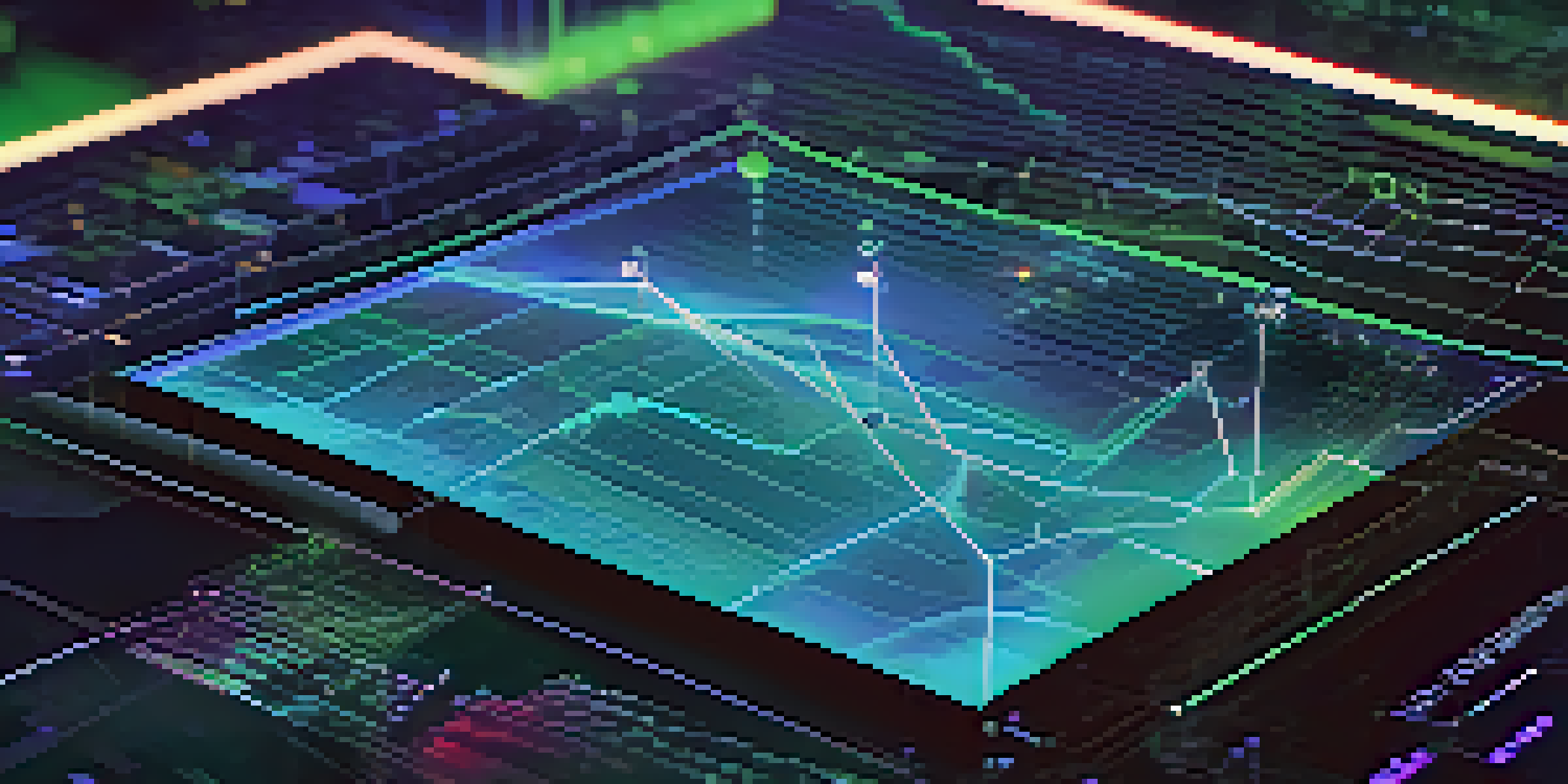Real-World Applications of Oracles in Blockchain Technology

Understanding Oracles: The Bridge Between Data and Blockchain
Oracles are essential components in the blockchain ecosystem, acting as intermediaries that provide smart contracts with external data. Without oracles, blockchains would be isolated systems, unable to access real-world information. Think of oracles as translators that help smart contracts understand and interact with data from outside their own environment.
Oracles serve as the critical link between the blockchain and real-world data, enabling smart contracts to respond to external events and conditions.
There are different types of oracles, including software, hardware, and consensus-based oracles. Software oracles pull data from online sources, like APIs, while hardware oracles gather data from the physical world through devices like IoT sensors. Each type plays a crucial role in ensuring that smart contracts have the information they need to function effectively.
This interplay between oracles and smart contracts is vital for the blockchain's ability to automate processes and execute agreements based on real-world events. By bridging the gap between digital and physical realms, oracles enhance the functionality and reliability of blockchain applications.
Decentralized Finance (DeFi) and Oracles: A Perfect Match
The DeFi sector heavily relies on oracles to provide accurate price feeds for digital assets. These oracles ensure that smart contracts can execute trades at fair market prices, preventing manipulation and ensuring transparency. For instance, when you swap one cryptocurrency for another on a decentralized exchange, oracles help determine the correct exchange rate in real-time.

Many DeFi platforms utilize decentralized oracles like Chainlink to aggregate data from multiple sources, minimizing the risk of relying on a single data point. This decentralization enhances security and reduces the chances of a 'single point of failure.' By pooling data from various exchanges, these oracles provide a more accurate and trustworthy price feed.
Oracles Connect Blockchain to Reality
Oracles serve as intermediaries that enable smart contracts to access real-world data, enhancing the functionality of blockchain applications.
Moreover, the continuous evolution of DeFi protocols has led to innovative uses of oracles, such as collateralization and automated liquidations. As DeFi continues to grow, the role of oracles will expand, making them indispensable for future developments in this space.
Supply Chain Management: Tracking Goods with Oracles
Oracles are transforming supply chain management by providing real-time data about the movement and condition of goods. For example, IoT devices can be used to monitor temperature and humidity levels during transport, ensuring that perishable goods remain safe. This data can then be fed into blockchain systems through oracles, enhancing transparency and traceability.
The future of decentralized finance relies heavily on accurate and reliable oracles to ensure that smart contracts can act on real-time data.
By integrating oracles into supply chain processes, companies can automate contract execution based on real-world conditions. If a shipment doesn't meet specified conditions, the smart contract can trigger actions such as refunds or rerouting. This reduces manual interventions, streamlining operations and minimizing errors.
The ability to verify and record real-time data on the blockchain enhances accountability among all parties involved. As more businesses recognize the benefits, oracles are becoming crucial in building trust and efficiency in supply chain ecosystems.
Insurance Industry Innovations Powered by Oracles
The insurance industry is leveraging oracles to automate claims processing and enhance underwriting decisions. For instance, in travel insurance, an oracle can provide real-time data on flight delays or cancellations, automatically triggering claims without the need for manual intervention. This not only speeds up the process but also improves customer satisfaction.
Oracles can also facilitate parametric insurance, where payouts are based on predefined conditions rather than traditional claims processes. For example, if a natural disaster occurs, the oracle can quickly assess the situation and trigger payments to affected policyholders. This approach minimizes disputes and accelerates relief efforts.
DeFi and Oracles Ensure Price Accuracy
In decentralized finance, oracles provide accurate price feeds for digital assets, which is crucial for executing trades fairly and transparently.
By integrating oracles into their operations, insurance companies can reduce fraud and improve efficiency, ultimately benefiting both providers and customers. As the industry continues to embrace technology, oracles will play a pivotal role in shaping its future.
Gaming and NFTs: Enhancing Experiences with Oracles
Oracles are making waves in the gaming industry, particularly in the realm of non-fungible tokens (NFTs) and play-to-earn models. They enable games to access real-world data, such as player statistics or game outcomes, which can influence in-game rewards and asset values. This integration creates a more dynamic and engaging gaming experience.
In NFT marketplaces, oracles can provide information about the rarity and market value of digital assets. This helps buyers and sellers make informed decisions based on real-time data. For instance, if an oracle reports a surge in demand for a particular NFT, it can affect its market price instantly.
As gaming evolves, the role of oracles will become increasingly significant, driving innovation in game design and monetization strategies. The potential for cross-platform interactions using oracles will further enhance the gaming landscape, making it more interconnected and rewarding.
Healthcare Applications: Oracles Improving Patient Care
In the healthcare sector, oracles are being used to streamline processes and improve patient outcomes. They can provide real-time data from medical devices, allowing healthcare providers to monitor patients' vital signs remotely. This data can be recorded on a blockchain, ensuring accuracy and enhancing patient security.
Moreover, oracles can facilitate secure sharing of medical records across different healthcare systems. By providing verified data, they help ensure that all parties involved have access to the necessary information for making informed decisions. This can significantly reduce delays in care and improve overall patient satisfaction.
Oracles Revolutionize Supply Chains
By integrating real-time data through oracles, supply chain management can automate processes and enhance transparency and accountability among stakeholders.
As the healthcare industry continues to embrace digital transformation, the use of oracles will expand, driving innovations in telemedicine and personalized care. Their ability to connect various data sources will ultimately lead to better healthcare outcomes and more efficient systems.
Future Trends: The Growing Importance of Oracles
As blockchain technology matures, the demand for reliable oracles will only increase. Industries are beginning to realize the potential of oracles to bridge the gap between real-world data and blockchain applications. This growing recognition is leading to more investment in oracle solutions and their integration across various sectors.
Future developments may include enhanced security measures, improved data accuracy, and even the emergence of new types of oracles tailored to specific industries. For example, specialized oracles could be developed for the energy sector to monitor and report on energy consumption and pricing in real-time.

With the rise of decentralized finance, supply chain innovations, and other applications, oracles are set to become indispensable tools in the blockchain toolkit. Their ability to provide accurate and timely data will help unlock new possibilities, making them crucial in shaping the future of technology.